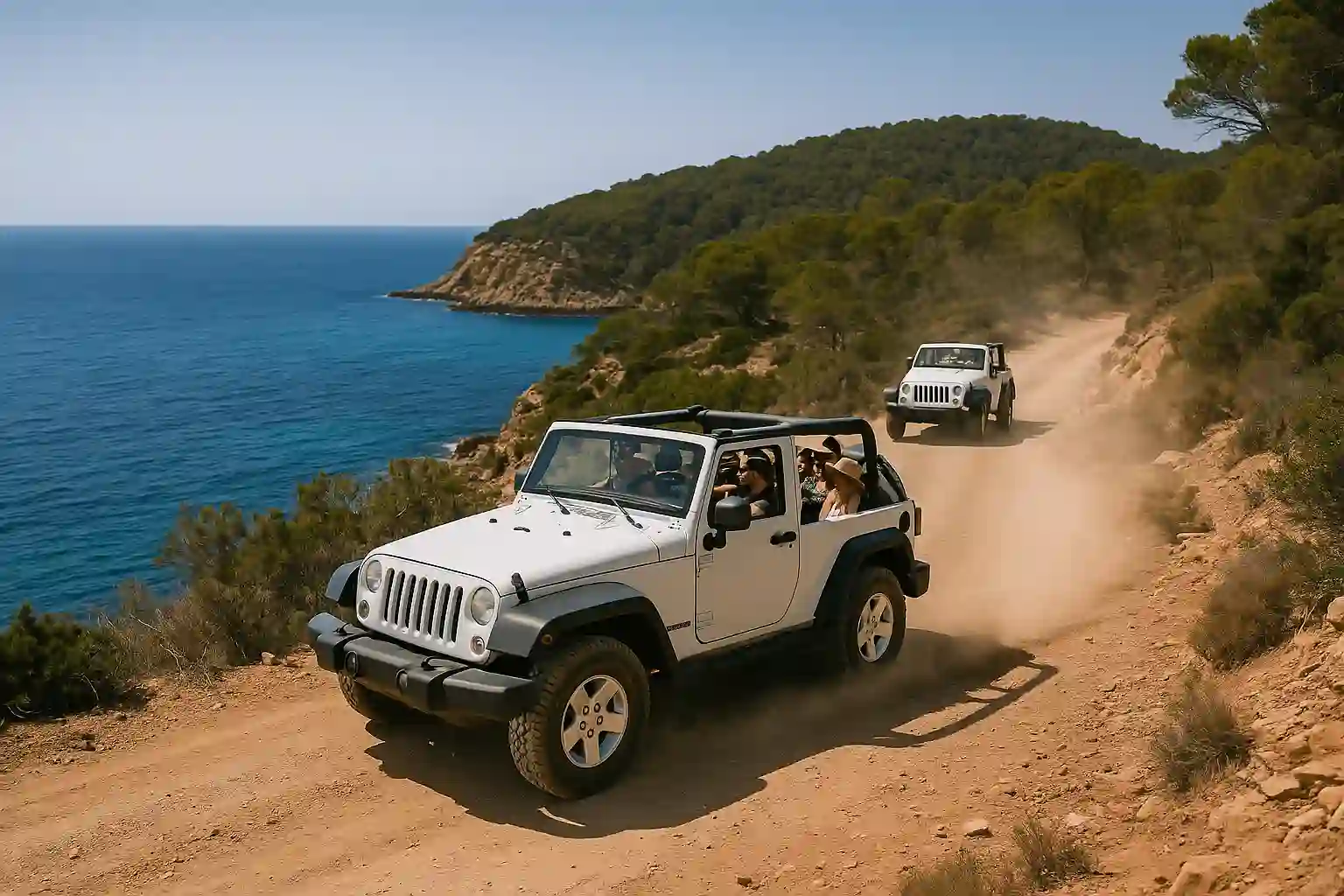Ibiza Jeep Safari – Viewpoints, Dusty Tracks, and Stories in the Pines

Departure is easy: a quick briefing, a grin from the driver, and we nose into the hills. The tarmac gives way to camins — old farm tracks stitched with stone. Pine resin warms in the sun; the air smells like honey and dust. Ibiza Town shrinks behind us to white geometry; ahead, the island turns textured and intimate.
Terraces, Wells, and Dry-Stone Wisdom
Our first stop is a stepped hillside, the old Balearic technology of terraces. Dry-stone walls hold red earth the way careful hands hold water. The guide sketches a story: centuries of small harvests, olives and almonds, cisterns that taught a thirsty island how to plan. I run a palm along the stone — warm, rough, patient.
Words gather with the dust: bancales (terraces), aljibe (cistern), carrasca (holm oak). Spanish here is practical, shaped by land and work. A raven cuts a black line across the sky; we climb back in and the jeep trades shade for sun, forest for cliff.
Viewpoints That Make Time Slow
The road lifts to a lookout where the sea looks poured from a height. Below, coves sew thread-fine beaches between rock shoulders; offshore, a lonely islet keeps its own weather. Everyone grows quieter. You can measure a viewpoint by the number of words it steals.
Tracks to Secret Coves
We drop back to sea level on a road so narrow the jeep breathes in. At the end: a cove of water like held glass. The guide points where fishermen carved boat huts into rock; a kid balances on flat stone and gathers courage for a quick jump. Someone says “¡claro!” and the cove answers with a silver flick of fish.
Swim, don’t swim — both are correct. I slide into the water and collect sea words for later: posidonia (the protecting seagrass meadows), medusa (jellyfish), orilla (shore). Language learned with salt on your lips resists forgetting.
Stone Towers and Watchful Horizons
Back in the jeep, the route threads a headland crowned with a round tower — one of the island’s 18th-century sentinels against pirates. The guide tells a quick story of signal fires, hidden bays, and the old maritime chess game played across these islands. Ibiza’s party is recent; its habit of watching the horizon is ancient.
We lean on the wall and the sea behaves like history always does — calm from a distance, complicated up close. The word I pocket here is vigía: lookout. It names both a building and a way of paying attention.
Picnic Shade, Island Staples
Noon calls for pine shade and something simple: bread that cracks, tomatoes that taste like sun, local cheese with a nutty edge, olives that reframe salt as flavor rather than thirst. The guide pours water into plastic cups and offers that widest Spanish invitation — “¡que aproveche!”
For learners, picnic Spanish is perfect: cuchillo (knife), servilleta (napkin), rebanada (slice). If you want to take the island’s language with you to the meeting room, pair days like this with Business Spanish lessons — the shift from friendly small talk to confident professional chat becomes surprisingly short.
Red Earth, Green Pines, Blue Refrains
Afternoon routes loop through farm tracks and woodland spines. Dust braids the air behind us like a scarf. We pass a white chapel crouched on a hill; the guide mentions saints’ days, village festivals, and the island’s calendar of old rhythms that quietly persist beneath the summer gloss.
The last stop is another high place. Es Vedrà sits off the west coast like a thought you can’t quite finish. Superstitions, magnetic whispers, bird routes — the rock collects stories the way a harbor collects boats. We don’t solve any of them. Good islands prefer their mysteries slightly ajar.
Back to Town, Carrying Dust and New Words
The jeep rolls home; the day unspools. In the rearview mirror, the sea keeps doing its fast magic with light. Ibiza Town resumes its geometry; cafés strike afternoon sparks. I keep three souvenirs: a pine needle in my shoe, a pocket of red dust, and a page of Spanish I didn’t have this morning.
